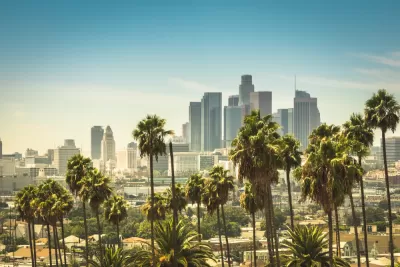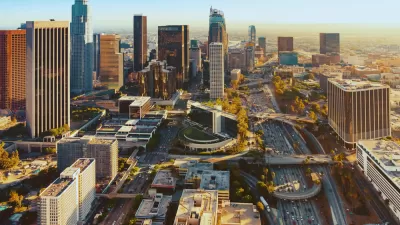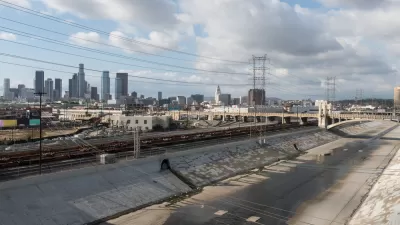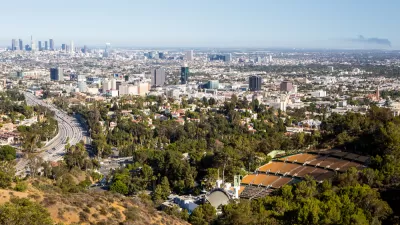Los Angeles is poised to approve a trio of long-planned zoning code updates—for the neighborhoods of Boyle Heights, Downtown, and Hollywood—as the first test cases for a new citywide zoning code update known as re:code LA.

The Los Angeles City Planning Commission in April approved the Boyle Heights Community Plan Update, clearing the way for a City Council vote that would enact one of the city’s first applications of a zoning code update in the works for the past decade, known as re:code LA. The Boyle Heights Community Plan update will soon be joined by community plans for Downtown Los Angeles and Hollywood as the initial applications of the city’s new zoning code.
A recent article by Steven Sharp for Urbanize LA opens with details about the Boyle Heights Community Plan update. Sharp writes, with more detail in the source article:
Since the onset of the update effort, the Planning Department has opted to shift growth in Boyle Heights toward commercial boulevards and transit corridors like Soto Street, 1st Street, and Whittier Boulevard, while maintaining the existing profile of the lower-scale residential neighborhoods of the predominantly renter neighborhood. Likewise, the proposed update maintains existing industrial zones adjacent to the L.A. River.
As for the application of the city’s new zoning code, Sharp adds the following details:
The plan, as one of the first out the gate following re:code LA, also enacts several elements of L.A.'s new zoning code. These include form and frontage districts which shape the height and massing of new construction - for example a provision to maintain the two-story massing of the Cesar Chavez Avenue business corridor, while shifting the mass of new construction to the rear of sites.
Sharp provides a similar amount of detail to the Central City and Central City North community plans, also known as DTLA 2040, noting that the DTLA 2040 plan recently advanced out of council committee and will appear before the council with a provision that calls for mandatory inclusionary zoning. “Likewise, the DTLA 2040 plan includes its own community benefits program - a base-bonus system which will replace the existing Transfer of Floor Area rights program which has shaped much of the skyline. Instead, developers will be able to build beyond the base zoning of their properties through providing a range of incentivized uses such as public open space and affordable housing.”
The source article, linked below, also includes details about the Hollywood Community Plan update. This particular corner of the city has proven very difficult to plan for in the past—with litigation and controversy interrupting and even overturning a previous iteration of the Hollywood Community Plan.
“Housing growth within Hollywood would be concentrated along existing transit lines and commercial hubs- including Hollywood and Sunset Boulevards. The Media District, mostly located south of Santa Monica Boulevard to the west of Vine Street, is expected to be reinforced as an employment hub, with greater height limits and new incentives for media uses,” writes Sharp.
FULL STORY: Community plan updates move forward for Boyle Heights, DTLA, Hollywood

Alabama: Trump Terminates Settlements for Black Communities Harmed By Raw Sewage
Trump deemed the landmark civil rights agreement “illegal DEI and environmental justice policy.”

Planetizen Federal Action Tracker
A weekly monitor of how Trump’s orders and actions are impacting planners and planning in America.

How Atlanta Built 7,000 Housing Units in 3 Years
The city’s comprehensive, neighborhood-focused housing strategy focuses on identifying properties and land that can be repurposed for housing and encouraging development in underserved neighborhoods.

In Both Crashes and Crime, Public Transportation is Far Safer than Driving
Contrary to popular assumptions, public transportation has far lower crash and crime rates than automobile travel. For safer communities, improve and encourage transit travel.

Report: Zoning Reforms Should Complement Nashville’s Ambitious Transit Plan
Without reform, restrictive zoning codes will limit the impact of the city’s planned transit expansion and could exclude some of the residents who depend on transit the most.

Judge Orders Release of Frozen IRA, IIJA Funding
The decision is a victory for environmental groups who charged that freezing funds for critical infrastructure and disaster response programs caused “real and irreparable harm” to communities.
Urban Design for Planners 1: Software Tools
This six-course series explores essential urban design concepts using open source software and equips planners with the tools they need to participate fully in the urban design process.
Planning for Universal Design
Learn the tools for implementing Universal Design in planning regulations.
Jessamine County Fiscal Court
Caltrans
Institute for Housing and Urban Development Studies (IHS)
City of Grandview
Harvard GSD Executive Education
Toledo-Lucas County Plan Commissions
Salt Lake City
NYU Wagner Graduate School of Public Service





























